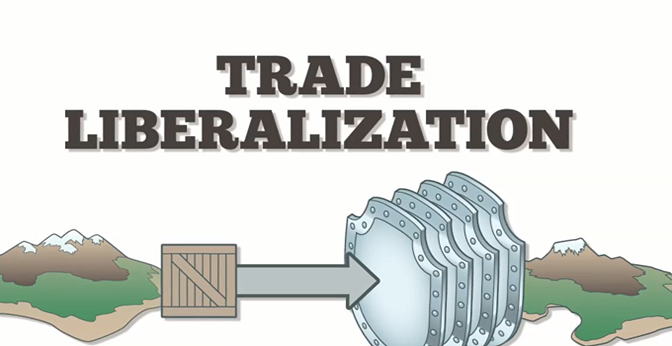Image source: investopedia.com
Trade liberalization is the reduction of restrictions or barriers to the exchange of goods between nations. It focuses on reducing tariff obstacles such as exercise duty and other licensing rules.
The aim of trade liberalization is to ease trade and ensure there are free trade zones. Let’s take a look at the pros and cons of trade liberalization.
Pros:
1. Reduced costs: Promoting free trade by reduction of trade restrictions results in more goods in the country since imports are subjected to lower fees.
2. Competitive edge: Trade liberalization provides an incentive for increased efficiency of domestic firms and ensures cheaper production of products. This leads to increased competition for domestic products and foreign products.
3. Increased economic growth: Regulating tariffs and customs duties on imports and exports can lead to increased economic growth among the participating nations.
4. Technology transfer: Interaction with multi-national firms may lead to the transfer of technology from a well-established nation to a low-developed nation.
5. Reduce government spending: Promoting free trade has led to the re-allocation of government funds away from subsidies and concentrating on other causes. It also reduces government spending on providing certain products or services to the public.
6. Attracts foreign investors: Trade liberalization reduces restrictions on the sale of foreign products and also offers free trade zones for investors. This acts as an incentive to attract foreign investors and increase country development and growth.
7. Shared expertise: Trade liberalization lead to shared expertise which is brought by the companies doing business globally.
8. Create job opportunities: As industries expand by exporting products to foreign countries, demand for goods and services increases. This forces businesses to hire more labor force in order to help in the delivery of services.
9. Lower oil prices: Reducing tariffs lead to the importation of oil from Canada and Mexico at low costs. This not only reduces production cost but also reduce the prices of commodities.
10. Integration of culture: Through interaction in the global market can make people diffuse their culture and use the cultural belief of other nations.
Cons:
1. Reduced support of local industries: Importing products increases competition from foreign industries making it difficult for domestic products to thrive in the market due to lack of protection and support.
2. Poor working conditions: Outsourcing of workers from countries without adequate labor protections will result in poor working conditions. Workers can work for long hours with low wage rates.
3. Theft of intellectual property rights: Doing business globally especially dealing with developed countries can have a negative impact on intellectual property rights due to fewer laws protecting patents.
4. Degradation of natural resources: Lack of environmental protection in developing countries will lead to exploitation or depletion of natural resources.
5. Threat from developed countries: Trade liberalization can affect the economy of a developing nation due to stiff competition from other established nations. Stiff competition can affect local industry diversity.
6. Increase job outsourcing: Free trade can lead to the outsourcing of highly skilled personnel from other nations and this affects the local job market.
7. Crowd out of local business: Promoting free trade will force small-scale farmers out of the market because they can’t compete with subsidized agricultural products from well-developed nations.
8. Reduce tax revenue: Trade liberalization will make less-developed nations struggle in order to replace revenue lost through import tariffs and other fees.
9. Destruct native culture: Developments of a nation can lead to the destruction of indigenous cultures. It may lead to the uprooting of local people due to the increased importation of foreign products.
10. Environmental impact: Free trade and globalization can lead to pollution of natural resources due to improper dumping of waste products from the manufacturing process.



